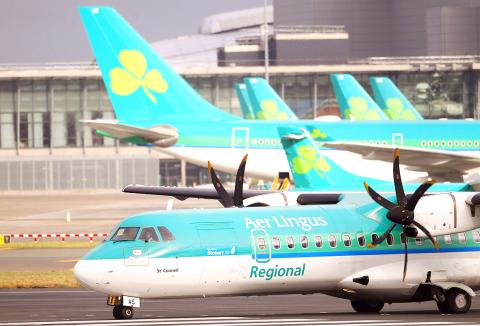The Irish government on Tuesday agreed to sell its 25 percent stake in Aer Lingus Group PLC to International Consolidated Airlines Group’s (IAG), paving the way for the owner of British Airways PLC and Iberia SA to make a formal bid for the Irish carrier.
IAG’s proposed 1.36 billion euro (US$1.48 billion) offer for Aer Lingus was recommended by the Irish airline’s board of directors in January, but is still conditional upon receiving the support of its other main shareholder, Ryanair Holdings PLC.
“There is a number of extremely important changes that have led to this decision by [the Irish] government today,” Irish Minister for Transport, Tourism and Sport Paschal Donohoe told a news conference after a Cabinet meeting.

Photo: AP
DUBLIN’S DEMANDS
In February, Dublin presented IAG with a list of new demands that it said had to be met before it would consider the sale, in areas including possible job cuts, transatlantic services and a longer guarantee on maintaining connections between Irish airports and London’s Heathrow Airport — the hub of British Airways — where Aer Lingus holds valuable runway slots.
Formally presenting its offer of 2.55 euros per share, IAG committed to Aer Lingus operating routes from Heathrow to Irish airports for at least seven years.
NETWORK GROWTH
“Acquiring Aer Lingus would add a fourth competitive, cost-effective airline to IAG, enabling us to develop our network using Dublin,” IAG chief executive Willie Walsh said in a statement.
Donohoe said Aer Lingus did not foresee any compulsory redundancies, despite the potential loss of 50 jobs next year, adding that the airline could add up to 635 new jobs by 2020.
The Irish government would spend the 335 million euros it receives on infrastructure projects, he added.
Ryanair still has to declare its hand. It declined to comment again on Tuesday on whether it would accept an offer by IAG for its 30 percent stake.
Aer Lingus, whose shares closed 1 percent higher at 2.39 euros on Tuesday in London trading, welcomed the decision, reiterating that it was a compelling transaction for the former flag carrier.
UNION RESISTANCE
The Irish government, which has been urged by opposition parties and trade unions to reject the IAG offer and also faced objections to it from some members of parliament, had said that Ryanair’s attitude was key to its decision.
Aer Lingus’ main trade union, IMPACT, reiterated after Dublin’s announcement that the deal was bad for workers.
A second major union, SIPTU, said it wanted commitments on compulsory redundancies and outsourcing.
Ireland’s ruling coalition was expected to put the decision to a vote in parliament as early as yesterday. In a joint statement, lawmakers from the Labour Party previously opposed to the sale said the deal was a positive outcome.
Two lawmakers from Donohoe’s Fine Gael Party who had previously expressed reservations about the deal told reporters that they would likely support the sale.

SEEKING CLARITY: Washington should not adopt measures that create uncertainties for ‘existing semiconductor investments,’ TSMC said referring to its US$165 billion in the US Taiwan Semiconductor Manufacturing Co (TSMC, 台積電) told the US that any future tariffs on Taiwanese semiconductors could reduce demand for chips and derail its pledge to increase its investment in Arizona. “New import restrictions could jeopardize current US leadership in the competitive technology industry and create uncertainties for many committed semiconductor capital projects in the US, including TSMC Arizona’s significant investment plan in Phoenix,” the chipmaker wrote in a letter to the US Department of Commerce. TSMC issued the warning in response to a solicitation for comments by the department on a possible tariff on semiconductor imports by US President Donald Trump’s

‘FAILED EXPORT CONTROLS’: Jensen Huang said that Washington should maximize the speed of AI diffusion, because not doing so would give competitors an advantage Nvidia Corp cofounder and chief executive officer Jensen Huang (黃仁勳) yesterday criticized the US government’s restrictions on exports of artificial intelligence (AI) chips to China, saying that the policy was a failure and would only spur China to accelerate AI development. The export controls gave China the spirit, motivation and government support to accelerate AI development, Huang told reporters at the Computex trade show in Taipei. The competition in China is already intense, given its strong software capabilities, extensive technology ecosystems and work efficiency, he said. “All in all, the export controls were a failure. The facts would suggest it,” he said. “The US

The government has launched a three-pronged strategy to attract local and international talent, aiming to position Taiwan as a new global hub following Nvidia Corp’s announcement that it has chosen Taipei as the site of its Taiwan headquarters. Nvidia cofounder and CEO Jensen Huang (黃仁勳) on Monday last week announced during his keynote speech at the Computex trade show in Taipei that the Nvidia Constellation, the company’s planned Taiwan headquarters, would be located in the Beitou-Shilin Technology Park (北投士林科技園區) in Taipei. Huang’s decision to establish a base in Taiwan is “primarily due to Taiwan’s talent pool and its strength in the semiconductor

French President Emmanuel Macron has expressed gratitude to Hon Hai Precision Industry Co (鴻海精密) for its plan to invest approximately 250 million euros (US$278 million) in a joint venture in France focused on the semiconductor and space industries. On his official X account on Tuesday, Macron thanked Hon Hai, also known globally as Foxconn Technology Group (富士康科技集團), for its investment projects announced at Choose France, a flagship economic summit held on Monday to attract foreign investment. In the post, Macron included a GIF displaying the national flag of the Republic of China (Taiwan), as he did for other foreign investors, including China-based